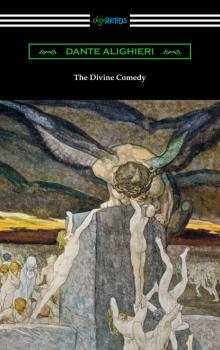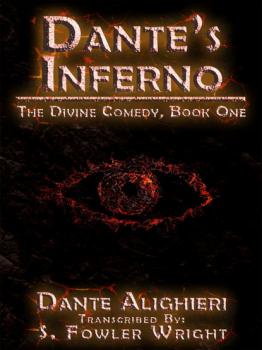Данте Алигьери
Список книг автора Данте АлигьериDante's Paradiso (The Divine Comedy, Volume II, Paradise) [Translated by Henry Wadsworth Longfellow with an Introduction by Ellen M. Mitchell]
Dante Alighieri was born in Florence, Italy in the middle of the 13th century and what is principally known of him comes from his own writings. One of the world’s great literary masterpieces, “The Divine Comedy” is at its heart an allegorical tale regarding man’s search for divinity. The work is divided into three sections, “Inferno”, “Purgatorio”, and “Paradiso”, each containing thirty-three cantos. It is the narrative of a journey down through Hell, up the mountain of Purgatory, and through the revolving heavens into the presence of God. In this aspect it belongs to the two familiar medieval literary types of the Journey and the Vision, however Dante intended the work to be more than just simple allegory, layering the narrative with rich historical, moral, political, literal, and anagogical context. In order for the work to be more accessible to the common readers of his day, Dante wrote in the Italian language. This was an uncommon practice at the time for serious literary works, which would traditionally be written in Latin. One of the truly great compositions of all time, “The Divine Comedy” has inspired and influenced readers ever since its original creation. Presented here is the third volume of “The Divine Comedy” translated into English verse by Henry Wadsworth Longfellow. This edition includes an introduction by Ellen M. Mitchell.
Dante's Inferno (The Divine Comedy: Volume I, Hell)
Dante Alighieri was born in Florence, Italy in the middle of the 13th century and what is principally known of him comes from his own writings. One of the world’s great literary masterpieces, the “Divine Comedy” is at its heart an allegorical tale regarding man’s search for divinity. The work is divided into three sections, “Inferno”, “Purgatorio”, and “Paradiso”, each containing thirty-three cantos. It is the narrative of a journey down through Hell, up the mountain of Purgatory, and through the revolving heavens into the presence of God. In this aspect it belongs to the two familiar medieval literary types of the Journey and the Vision, however Dante intended the work to be more than just simple allegory, layering the narrative with rich historical, moral, political, literal, and anagogical context. In order for the work to be more accessible to the common readers of his day, Dante wrote in the Italian language. This was an uncommon practice at the time for serious literary works, which would traditionally be written in Latin. One of the truly great compositions of all time, the “Divine Comedy” has inspired and influenced readers ever since its original creation. Presented here is the first volume of the “Divine Comedy” translated into English verse by Henry Wadsworth Longfellow.
Dante's Purgatorio (The Divine Comedy, Volume II, Purgatory) [Translated by Henry Wadsworth Longfellow with an Introduction by William Warren Vernon]
Dante Alighieri was born in Florence, Italy in the middle of the 13th century and what is principally known of him comes from his own writings. One of the world’s great literary masterpieces, “The Divine Comedy” is at its heart an allegorical tale regarding man’s search for divinity. The work is divided into three sections, “Inferno”, “Purgatorio”, and “Paradiso”, each containing thirty-three cantos. It is the narrative of a journey down through Hell, up the mountain of Purgatory, and through the revolving heavens into the presence of God. In this aspect it belongs to the two familiar medieval literary types of the Journey and the Vision, however Dante intended the work to be more than just simple allegory, layering the narrative with rich historical, moral, political, literal, and anagogical context. In order for the work to be more accessible to the common readers of his day, Dante wrote in the Italian language. This was an uncommon practice at the time for serious literary works, which would traditionally be written in Latin. One of the truly great compositions of all time, “The Divine Comedy” has inspired and influenced readers ever since its original creation. Presented here is the second volume of “The Divine Comedy” translated into English verse by Henry Wadsworth Longfellow. This edition includes an introduction by William Warren Vernon.
Inferno
"Here at last that much suffering reader will find Dante's greatness manifest, and not his greatness only, but his grace, his simplicity, and his affection."—William Dean Howells, The Nation"As a crown to his literary life, Longfellow combines his exquisite scholarship and his poetic skill and experience in the translation of one of the great poems of the world."—Harper's MonthlyEnter the unforgettable world of The Inferno and travel with a pair of poets through nightmare landscapes of eternal damnation to the very core of Hell. The first of the three major canticles in La divina commedia (The Divine Comedy), this fourteenth-century allegorical poem begins Dante's imaginary journey from Hell to Purgatory to Paradise. His encounters with historical and mythological creatures–each symbolic of a particular vice or crime–blend vivid and shocking imagery with graceful lyricism in one of the monumental works of world literature.This acclaimed translation was rendered by the beloved nineteenth-century poet, Henry Wadsworth Longfellow. A skilled linguist who taught modern languages at Harvard, Longfellow was among the first to make Dante’s visionary poem accessible to American readers.
The Divine Comedy (Translated by Henry Wadsworth Longfellow with an Introduction by Henry Francis Cary)
Dante Alighieri was born in Florence, Italy in the middle of the 13th century and what is principally known of him comes from his own writings. One of the world’s great literary masterpieces, the “Divine Comedy” is at its heart an allegorical tale regarding man’s search for divinity. The work is divided into three sections, “Inferno,” “Purgatorio,” and “Paradiso,” each containing thirty-three cantos. It is the narrative of a journey down through Hell, up the mountain of Purgatory, and through the revolving heavens into the presence of God. In this aspect it belongs to the two familiar medieval literary types of the Journey and the Vision, however Dante intended the work to be more than just simple allegory, layering the narrative with rich historical, moral, political, literal, and anagogical context. In order for the work to be more accessible to the common readers of his day, Dante wrote in the Italian language. This was an uncommon practice at the time for serious literary works, which would traditionally be written in Latin. One of the truly great compositions of all time, the “Divine Comedy” has inspired and influenced readers ever since its original creation. This edition is printed on premium acid-free paper, is translated into English verse by Henry Wadsworth Longfellow, and includes an introduction by Henry Francis Cary.
Dante's Inferno: The Divine Comedy, Book One
In his introduction, the translator says: «I suppose that a very great majority of English-speaking people, if they were asked to name the greatest epic poet of the Christian era in Western Europe, would answer Dante.» THE DIVINE COMEDY continues to be widely read today, whether for its religious inspiration or for the sheer power of its verse. The first part of the epic, THE INFERNO, tells how the narrator «loses his way,» and finds himself in a strange landscape he's never seen before. There he encounters the shade of the ancient Roman poet, Virgil, who offers to lead him through the nine circles of Hell. The damned of Dante's imagination, it's quite clear, have condemned themselves through their actions or inactions to become permanent prisoners of the nether regions. Down, down, down, go Dante and his guide, meeting friend and foe alike, with horror piled upon horror. Finally, they must climb Satan's body to find the only possible exit from this terrible place–where once more the poet will «see again the stars.»<P> A first-rate modern rendering of a literary classic!
HELL
One of the masterpieces of world literature, completed in 1320, Dante’s La Divina Commedia describes his journey through Hell, Purgatory and his eventual arrival in Heaven. In this new version of Dante’s masterpiece, Alasdair Gray offers an original translation in prosaic English rhyme.
Accessible, modern and sublimely decorated, this remarkable edition told in three parts yokes two great literary minds, seven hundred years apart, and brings the classic text alive for the twenty-first century.
PURGATORY
In part two of La Divina Commedia, one of the masterpieces of world literature, Dante and his guide, the poet Virgil, must enter and traverse Purgatory and the seven deadly sins in their quest to reach Heaven. In this colloquial version of Dante’s masterpiece, Alasdair Gray offers an original translation in his own unique idiom.
Lyrical and modern, this remarkable edition yokes two great literary minds, seven hundred years apart, and brings the classic text alive for the twenty-first century.









